DNA Testing Comes to Belize: A Single Hair Strand Could Solve a Crime
A single strand of hair, a drop of blood, the skin cells trapped under the nails of an attacker: these are the tiny traces of evidence that can hold the answers to who committed a crime. Until now, Belize had to rely on external referral of evidence to uncover the truths behind crime cases.
That’s about to change with the Deoxyribonucleic Acid (DNA) Bill, 2025
On October 2, Cabinet approved the introduction of the bill, a new law that seeks to establish a National DNA Database for use in criminal investigations, the prosecution of offences, and the identification of missing or unidentified persons.
The DNA Bill had its first reading in the House of Representatives on Friday, October 17, introduced by Minister of Home Affairs Kareem Musa. He described the establishment of a National DNA Database as an “extremely powerful crime-fighting tool,” adding that the bill had undergone “extensive review by local stakeholders for relevance and suitability to Belize’s context.”
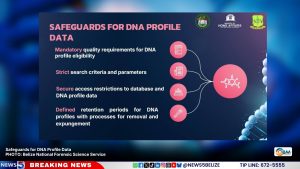
Safeguards for DNA Profile Data
What is the DNA Bill About?
According to the Bill, the Act aims to “facilitate the collection and use of DNA samples in the investigation and prosecution of indictable offences” and to “provide for the management, retention and destruction of DNA samples and DNA profiles.” It also establishes an oversight body to ensure transparency and accountability in how DNA data is handled.
How Will the DNA Database Work?
The Bill proposes that the National Forensic Science Service will manage the database through a designated custodian.
According to the bill, “The National DNA Database shall be maintained and operated by the Executive Director of the National Forensic Science Service, who shall be the Custodian.”
The database will include separate indexes for convicted persons, suspects, crime scenes, missing persons, relatives of missing persons, victims, volunteers, and unidentified deceased persons.
It states that the database must be “maintained and operated in a manner that respects a person’s bodily integrity, privacy and dignity and is consistent with human rights under the Constitution.”
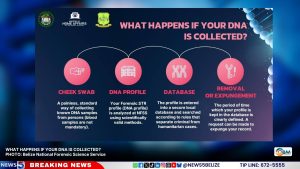
What Happens if your DNA is collected?
Who Will Collect DNA and When?
Can DNA be collected without consent? Not usually.
Under the Bill, no DNA sample, intimate or non-intimate, may be collected without the person’s written consent or a court order.
Intimate samples include “blood, tissue, a swab from the genitals, semen, pubic hair, urine, fluid from breaking the skin, and a foetus or product of conception.”
Non-intimate samples include “saliva, hair other than pubic hair, a nail or material found under a nail, a buccal swab, a swab of suspected blood or other bodily fluid from any part of the body other than a bodily orifice or the genitals.”
However, in cases where a suspect refuses, an investigating officer may apply for an order from a magistrate. The Bill explains that a magistrate may issue such an order if satisfied “that an offence has been committed” and that DNA analysis “will provide evidence about whether the bodily sample…was from that suspect.”
Only an authorised person, such as a medical practitioner, dentist, forensic scientist, or crime scene technician, may collect DNA samples. The process must ensure privacy and follow strict chain-of-custody procedures.
How Will DNA Information Be Protected?
The Bill places heavy emphasis on data protection. It states that the Custodian must “ensure the security, integrity and confidentiality of the National DNA Database.” Access will be strictly limited to authorised personnel, and individuals whose profiles are stored may request a copy of their DNA data.
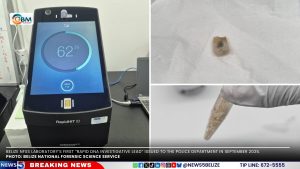
BELIZE NFSS LABORATORY’S FIRST “RAPID DNA INVESTIGATIVE LEAD” ISSUED TO THE POLICE DEPARTMENT IN SEPTEMBER 2025.
Data cannot be shared internationally except through Mutual Legal Assistance Treaties (MLATs) and only for lawful investigations. Any unauthorised access or tampering with the database will be treated as an offence punishable by a fine of up to $30,000 or imprisonment for three years.
What Happens to DNA Samples After Cases End?
How long will DNA be kept? According to the Bill, suspects are entitled to have their DNA samples destroyed “not later than three months after investigations reveal that the suspect was not involved in the commission of an offence, the suspect is acquitted of the offence or the charge is withdrawn,” or if no charge is filed within twelve months.
For those convicted, DNA may be retained for up to thirty years.
If a conviction is overturned or an investigation clears a suspect, the custodian must ensure that the profile “is permanently removed from the National DNA Database.”
Who Will Oversee the System?
To prevent misuse, the law proposes a DNA Oversight Committee of eleven members appointed by the minister responsible for forensic science services.
This body will include representatives from the Attorney General’s Ministry, the Bar Association, forensic science experts, medical ethicists, and data protection specialists.
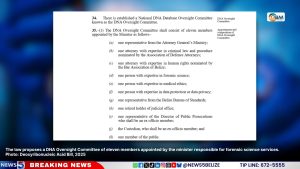
The law proposes a DNA Oversight Committee of eleven members appointed by the minister responsible for forensic science services.
The committee is tasked to “oversee the operation and management of the National DNA Database,” to maintain its integrity, security, and compliance with the law, and to ensure data protection standards are met.
Other responsibilities of the committee include:
- Staying current with new forensic technologies,
- Reviewing retention periods for DNA samples,
- Advising the police, the National Forensic Science Service, and authorised labs on policies, practices, and procedures related to the DNA system.
- Monitoring the database’s impact on specific groups such as indigenous peoples, women, and vulnerable persons.
- Promoting public awareness and understanding of the National DNA Database.
- Advising the Minister on any issues related to the Act and evaluating proposals for its amendment.
Why Does This Bill Matter?
The DNA Bill represents one of Belize’s most significant justice reforms in recent years. It has the potential to speed up investigations, improve prosecution outcomes, and bring closure to families searching for missing loved ones.
Yet, as the Bill itself recognises, the power of DNA technology comes with a very delicate responsibility. Its success depends on maintaining the delicate balance between public safety and individual rights.
As it states in the Act, the purpose of the bill is to “operate a National DNA Database in a manner that respects a person’s bodily integrity, privacy and dignity.”




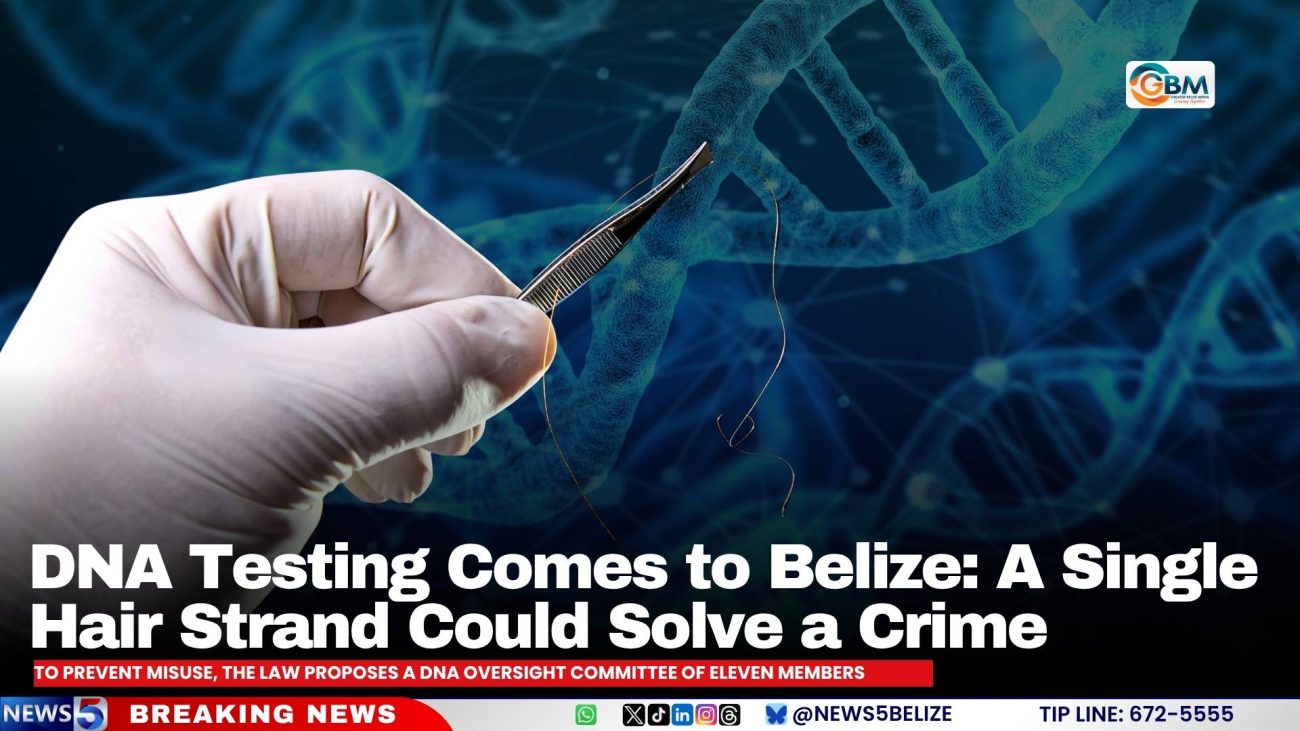

Facebook Comments